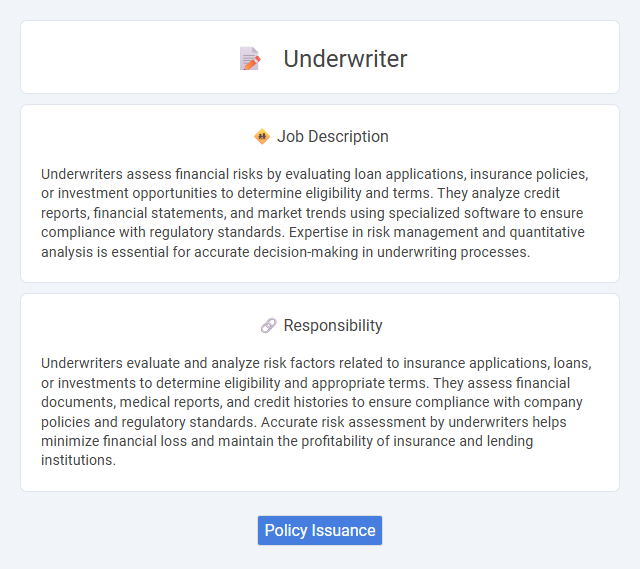
Underwriters assess financial risks by evaluating loan applications, insurance policies, or investment opportunities to determine eligibility and terms. They analyze credit reports, financial statements, and market trends using specialized software to ensure compliance with regulatory standards. Expertise in risk management and quantitative analysis is essential for accurate decision-making in underwriting processes.
Individuals with strong analytical skills and attention to detail are likely to be well-suited for an underwriter position, given the job's emphasis on assessing risk and evaluating financial information. Those who remain calm under pressure and have effective decision-making abilities might find it easier to navigate the responsibilities of determining insurance eligibility and terms. People who prefer structured environments and enjoy working with data may probably thrive in this role, while those who dislike repetitive tasks or high-stakes judgment calls may find it less suitable.
Qualification
Underwriters typically require a bachelor's degree in finance, economics, or business administration, with strong analytical and mathematical skills essential for evaluating risk. Professional certifications such as Chartered Property Casualty Underwriter (CPCU) or Certified Insurance Counselor (CIC) enhance career prospects and demonstrate specialized expertise. Proficiency in risk assessment software and understanding regulatory compliance further qualify candidates for underwriting roles.
Responsibility
Underwriters evaluate and analyze risk factors related to insurance applications, loans, or investments to determine eligibility and appropriate terms. They assess financial documents, medical reports, and credit histories to ensure compliance with company policies and regulatory standards. Accurate risk assessment by underwriters helps minimize financial loss and maintain the profitability of insurance and lending institutions.
Benefit
Underwriters likely provide significant benefits by assessing risks accurately, which helps companies minimize financial losses. Their expertise may enhance decision-making processes, contributing to more profitable and sustainable business operations. Effective underwriting could also improve customer satisfaction by ensuring fair and appropriate policy pricing.
Challenge
Underwriter roles often involve complex risk assessments that may challenge even experienced professionals, requiring sharp analytical skills and attention to detail. The probability of encountering ambiguous or incomplete information could increase the challenge of making accurate decisions. Adapting to evolving regulations and market conditions might further test an underwriter's ability to manage uncertainty effectively.
Career Advancement
Underwriters play a crucial role in assessing risk and determining insurance eligibility, setting the foundation for career growth within the financial services industry. Advancing in underwriting typically involves gaining expertise in specialized sectors such as commercial, life, or health insurance, alongside certifications like Chartered Property Casualty Underwriter (CPCU). Progression opportunities lead to senior underwriting positions, management roles, and strategic risk analysis jobs, emphasizing data analytics and regulatory compliance skills.
Key Terms
Policy Issuance
Underwriters evaluate insurance applications to determine risk eligibility and appropriate policy terms. They analyze financial data, medical records, and other relevant information to decide on policy issuance, ensuring compliance with company guidelines and regulatory standards. Efficient policy issuance by underwriters reduces processing time and supports accurate premium calculations for various insurance products.
 kuljobs.com
kuljobs.com